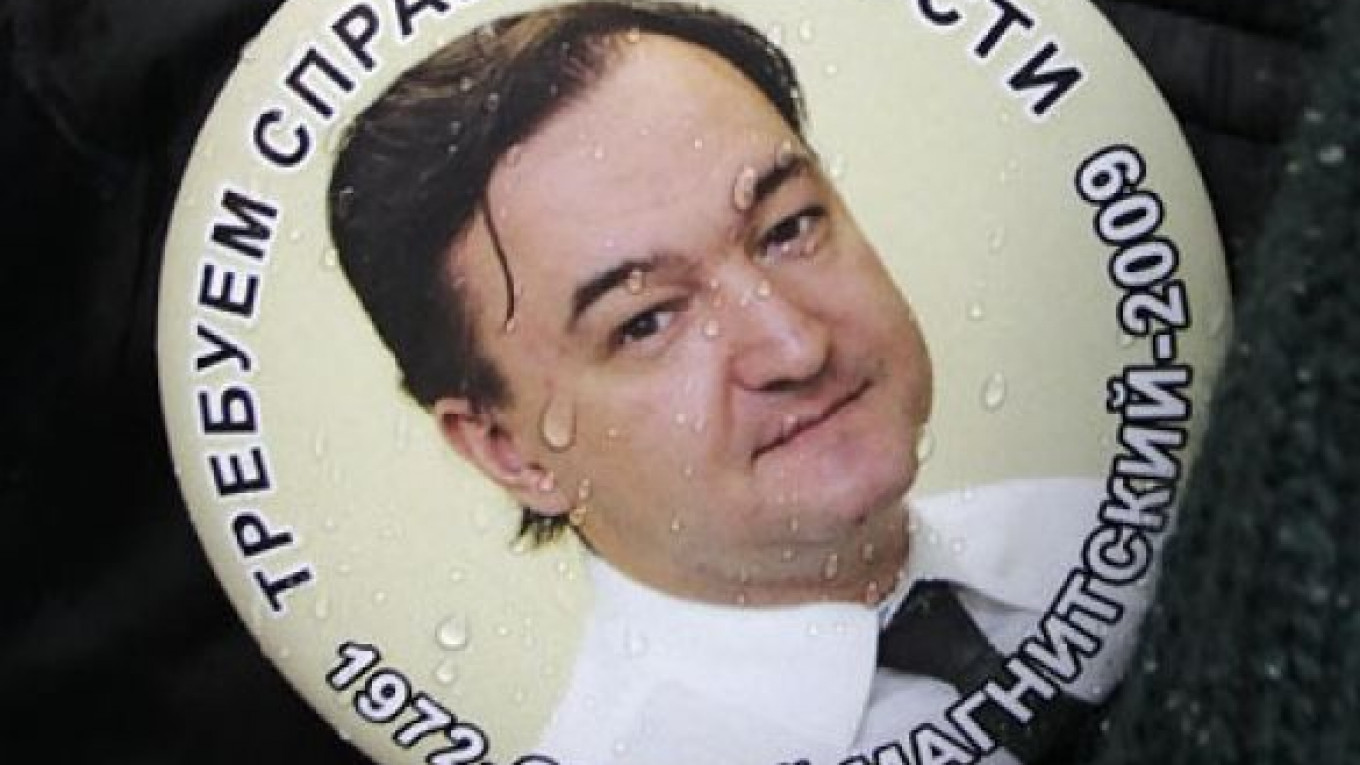Investigators said Tuesday that they had closed the case into the 2009 death of lawyer Sergei Magnitsky, whose name is attached to a U.S. law that has caused tension in U.S.-Russian relations by seeking to punish Russians implicated in human rights violations.
An inquiry into Magnitsky's treatment and death in a Moscow jail, where he was awaiting trial on tax evasion charges brought after he accused government officials of a fraudulent $230 million tax rebate scheme, revealed no evidence of wrongdoing, the Investigative Committee said in a statement.
The committee's findings contradict a 2011 investigation by the Kremlin human rights council, which said Magnitsky was pressured by prison authorities over his testimony in the tax fraud case and was left to die of pancreatitis in an isolation cell. The council's investigation also found that Magnitsky had been beaten in prison and that there was insufficient evidence to jail him.
William Browder, head of Magnitsky's former employer Hermitage Capital, said that the Investigative Committee's action was not a surprise to him and that it was "a result of basically politically motivated intervention by [President Vladimir] Putin to change the narrative of what really happened to Sergei," Radio Free Europe reported.
In December, the United States passed the Sergei Magnitsky Rule of Law Accountability Act, which imposes a visa ban and asset freezes on Russians suspected in Magnitsky's death and other human rights violations.
The law argued that the officials whom Magnitsky implicated in the corruption scheme enjoyed impunity in Russia, noting that no one had been convicted in connection with his "false arrest" and that negligence charges were dropped in April 2012 against the head doctor at the Matrosskaya Tishina prison, where Magnitsky died. A Moscow court acquitted a doctor at another jail where Magnitsky was held of negligence charges in December.
Russia responded to the U.S. law with the so-called anti-Magnitsky act, which stipulates a visa ban and asset freezes for suspected U.S. human rights violators as well as a ban on U.S. adoptions of Russian children, which has been lambasted by opposition groups and U.S. officials for using children as political pawns.
Valery Borshchyov, a veteran human rights activist who led the group that authored the report investigating Magnitsky's death, said activists would demand that the investigation be reopened.
"We will address the president and other officials, because this defiant action threatens the observance of fundamental human rights in Russia," he told Interfax.
Borshchyov, who is also a member of the Public Monitoring Commission, an officially sanctioned prison watchdog, said investigators ignored the council's report on numerous occasions.
"There are documents regarding the use of a billy club, handcuffs — he was beaten. There is a death certificate that said he had a traumatic brain injury," he said.
The Investigative Committee statement said that according to autopsy reports, Magnitsky died from heart failure and an accumulation of fluid in his lungs and brain caused by diabetes and hepatitis.
Another Kremlin human rights council member, Kirill Kabanov, said the Investigative Committee's decision was a reaction to the U.S. law seeking to punish Russian human rights violators, which Russian officials have denounced as "unfriendly and provocative."
"I didn't expect anything else after the Magnitsky Act was approved in the U.S.," Kabanov told Interfax.
The posthumous trial of Magnitsky on tax evasion charges is set to begin Friday in Moscow's Tverskoi District Court over the fierce objections of Magnitsky's relatives.
Jamison Firestone, Magnitsky's former employer, said by e-mail that he had never expected the Russian government to truly investigate Magnitsky's death and that the closing of the case only demonstrated that the government had "chosen to support corruption."
"In their 'investigation,' all they have is a tax case against Sergei and a tax theft case against Sergei prepared by the same officers who stole the money and falsely imprisoned Sergei," Firestone said.
In halting the investigation, the government helped protect "a lot of crooked Russian officials and their blood money, in Russia at least," he said.
Contact the authors at [email protected] and [email protected]
Related articles:
A Message from The Moscow Times:
Dear readers,
We are facing unprecedented challenges. Russia's Prosecutor General's Office has designated The Moscow Times as an "undesirable" organization, criminalizing our work and putting our staff at risk of prosecution. This follows our earlier unjust labeling as a "foreign agent."
These actions are direct attempts to silence independent journalism in Russia. The authorities claim our work "discredits the decisions of the Russian leadership." We see things differently: we strive to provide accurate, unbiased reporting on Russia.
We, the journalists of The Moscow Times, refuse to be silenced. But to continue our work, we need your help.
Your support, no matter how small, makes a world of difference. If you can, please support us monthly starting from just $2. It's quick to set up, and every contribution makes a significant impact.
By supporting The Moscow Times, you're defending open, independent journalism in the face of repression. Thank you for standing with us.
Remind me later.






